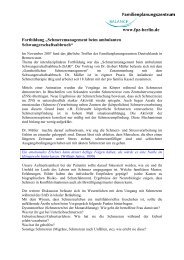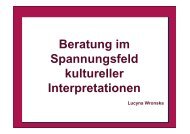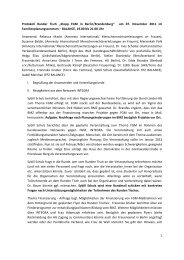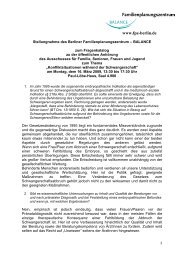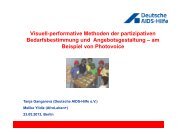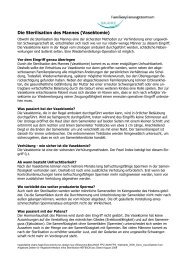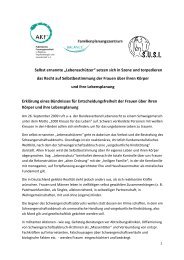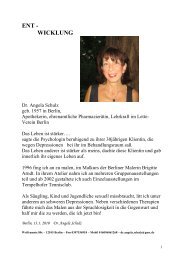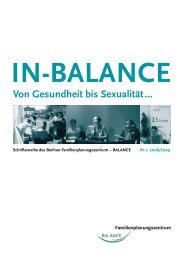Listening to African Voices - FPZ
Listening to African Voices - FPZ
Listening to African Voices - FPZ
You also want an ePaper? Increase the reach of your titles
YUMPU automatically turns print PDFs into web optimized ePapers that Google loves.
3.5.1. Follow-up project for girls at risk of beingsubjected <strong>to</strong> the practiceIn the second and third week of the quantitative survey,several researchers reported cases that demanded a closerinvestigation. These were:• Participants whose daughters had been subjected <strong>to</strong> thepractice in Africa;• Participants who made their intentions known <strong>to</strong> subjecttheir daughters <strong>to</strong> the practice.• Women participants who affirmed that their daughtersmight be subjected <strong>to</strong> the practice by the husband’s familyduring a holiday in their country of origin and that theywere not in a position <strong>to</strong> protect their daughters;• Women participants who were indifferent about the statusof their daughters and who announced that it did not matter<strong>to</strong> them if the daughters were subjected <strong>to</strong> the practiceduring a home visit <strong>to</strong> Africa.We organised an additional meeting <strong>to</strong> discuss each of thecases. The conclusions of the meeting were as follows:• No action could be taken for the daughters who had alreadybeen subjected <strong>to</strong> the practice. The girls concernedhad undergone FGM/C in Africa and most of them stilllived there. There was no means of tracing them in order<strong>to</strong> assess the need of support. A small minority of the girlswas living in Hamburg, but had been subjected <strong>to</strong> thepractice before migrating <strong>to</strong> Europe.• The other cases required a follow-up and moni<strong>to</strong>ring, butthere was no girl in immediate danger. The case analysisindicated that there was sufficient time <strong>to</strong> develop aresponse strategy.• We consulted an advisor of the intercultural centre inEimsbüttel 7 and our focal point at the BSG and developeda response strategy adapted <strong>to</strong> the needs of each individualcase. At the time of report writing, the need forfollow-up responses had been identified for 13 girls livingin nine different families of West <strong>African</strong> origin. 83.6. Difficulties and challenges during the projectThe difficulties were mainly linked <strong>to</strong> the mobilisation andavailability of participants, their reactions <strong>to</strong> the research<strong>to</strong>pic and the accessibility of communities from certaincountries.7 District of Hamburg.8 More detailed information about the response strategy and thefollow up project is available at Plan Germany’s office.3.6.1. Availability of participants and of women in particularThe interviewers reported repeatedly that it was challenging<strong>to</strong> fix appointments with potential participants. The beginningof the data collection coincided with the second weekof Ramadan and many families gathered outside workinghours <strong>to</strong> break the fast and were not available for interviews.Moreover, numerous <strong>African</strong> immigrants are shift-workersand difficult <strong>to</strong> reach as they start working very early orget home very late. Identifying women for interviews wasa particular challenge. They are less represented in placesof public gathering and less likely <strong>to</strong> accept an interviewon FGM/C with a stranger. Organising an interview with aMuslim women could be particularly time consuming. Theresearcher was expected <strong>to</strong> obtain an authorisation from thehusband before conducting the interview. This sometimesimplied that a researcher had <strong>to</strong> visit the same family severaltimes before being able <strong>to</strong> meet the husband and <strong>to</strong> make anappointment with the woman <strong>to</strong> conduct the interview.3.6.2. Lack of interest in the <strong>to</strong>picThe <strong>to</strong>pic of FGM/C proved <strong>to</strong> be of little or no interest <strong>to</strong>many immigrants approached during this research. Theycommunicated that it was not a priority issue for them andoften insisted on discussing their current problems linked<strong>to</strong> <strong>to</strong>pics like the status of their residence permit, the workpermission, job seeking or their accommodation. Moreover,some stated that this type of study should take place in Africaand not in Europe where people have other preoccupations.Men often responded that FGM/C is women’s businessand that they don’t see any use in participating. Membersof non-practicing groups often objected that FGM/C is of aslittle concern <strong>to</strong> them and that they have neither knowledgeof nor interest in the <strong>to</strong>pic.3.6.3. Mistrust and cautiousness of participantsThe interviewers encountered many immigrants who wereextremely suspicious and expected the questions <strong>to</strong> be traps,in particular questions related <strong>to</strong> their socio-demographicstatus. Items enquiring about the region of birth, the statusof the residence permit, ethnic group or marital statusseemed <strong>to</strong> awaken memories of frightening experiences withthe German authorities and the police. Numerous participantswere worried that their responses would be handedover <strong>to</strong> the German authorities and that the nature of theiranswers could have a negative impact on their residencestatus. Thus, many participants preferred <strong>to</strong> omit certainquestions from the socio-demographic section. Some participantsalso requested <strong>to</strong> be interviewed without the questionnaireand note taking. Persons without a residence permitwere particularly tight-lipped when it came <strong>to</strong> the sociodemographicsection. The interviewers were amazed <strong>to</strong> see18<strong>Listening</strong> <strong>to</strong> <strong>African</strong> <strong>Voices</strong>






